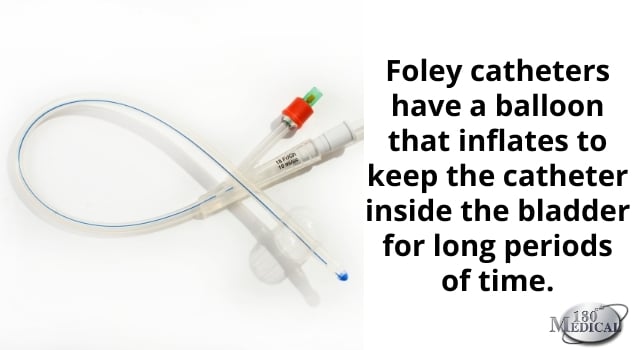What Are Catheters?
We’ve all heard about urinary catheters at some point. But what are urinary catheters?
When you’re told you need to start using urologic catheters to drain your bladder, you might think it will start limiting your daily activities or negatively impacting the quality of your life. After all, when people think of catheters, they often still think of the old standard indwelling catheter that stays attached to a bulky drain bag. But did you know that’s not your only catheter product option?
Let’s bust some myths about catheters and answer some common questions, such as: What is a urinary catheter? What types of catheters are available? What is a catheter used for? And more!
What Are Catheters and How Do Catheters Work?
A urologic catheter is a thin flexible tube that works to empty the bladder of urine.
Thousands of people across America use catheters independently. Sometimes a caregiver or healthcare professional will insert a catheter when necessary.
While most people catheterize through the urethra (the passage from the bladder through which urine typically flows), some people catheterize through a stoma. A stoma is a surgically created opening on the abdomen, which diverts urine out of the body. This might be the case for people after a urostomy surgery, Mitrofanoff procedure, or Indiana pouch surgery.
Why Would You Need a Catheter?
People end up needing to use catheters for various reasons and medical conditions. But when is a catheter usually used? Primarily, anyone whose bladder does not empty on its own may be prescribed to use catheters. That means anyone with difficulty peeing on their own, although sometimes people with urinary incontinence may also use catheters to empty their bladder and reduce leakage incidents.
However, a few common conditions that can sometimes lead to the need for urinary catheters can include:
- Neurogenic bladder
- Incomplete bladder emptying or urinary retention
- Urinary incontinence
- Nerve damage due to multiple sclerosis, spina bifida, cauda equina syndrome, spinal cord injury, or another condition that can impact the bladder
- Enlarged prostate or BPH (benign prostatic hyperplasia)
- Urethral obstructions
- Mitrofanoff procedure
- J-pouch or Indiana pouch surgery
- Bladder cancer
What Are the Types of Urinary Catheters Available?
Urethral catheters come in two primary types:
- Indwelling Foley catheters
- Intermittent urinary catheters
Indwelling Foley Catheters
Indwelling catheters are catheters that a healthcare professional or a caregiver typically insert. These catheters are designed to remain inside the bladder for longer periods. This allows urine to constantly drain out into an external collection device, such as a urine drain bag or leg bag.

While some people prefer using an indwelling catheter, this catheter type may increase the risk of urinary tract infections (UTIs) and bladder infections due to bacteria accumulating quickly inside the body.
Intermittent Urinary Catheters
Many people today prefer the independence and freedom that intermittent catheterization brings them. But what is an intermittent catheter?
An intermittent catheter is designed to be used ‘intermittently.’ In other words, a user can insert the catheter by themselves or with the help of a caregiver to drain the bladder at intervals throughout the day (as needed/prescribed by a healthcare professional).
Intermittent catheters come in different brands, sizes, styles, and lengths.
Three popular types of intermittent (in and out) catheters are closed system catheters, hydrophilic catheters, and intermittent catheters.
What Catheters Are Right for Me?
We know there are a lot of catheter options out there. It can feel overwhelming to navigate on your own.
That’s why 180 Medical emphasizes the importance of choice. You can choose from a wide selection of all major catheter brands and types.
Plus, we offer free samples. So you can try out and find what feels and works best for you, based on your preferences, needs, prescription, and insurance benefits.
We make the process of getting your supplies as easy as possible, so contact us at 180 Medical to start receiving the right intermittent catheters for you!

More Catheter Information and Catheterization Tips
Catheter Basics – A guide describing catheter sizing, length, and tip options.
180 Medical Online Catheter Catalog



